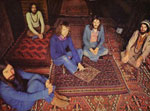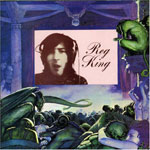
I’m not sure about pop nowadays. I’m not sure if it means anything at all. I’m not sure if it’s turned into a piece of cultural history, where like medieval scholars we’re all digging so deep among the roots and branches to find out that bit more about all the things we love. And more and more things are seeing the light of day. And we’re learning more about the people and events behind the music. It’s only natural. But is it necessarily a good thing? Does the mystery get messed with?
Way back in the early ‘80s the Edsel label started a salvage operation, bringing to light some of the lost groups from the original mod era. Timing wise this coincided with something just after the initial burst of energy generated by a grassroots mod resurgence, and collections by The Creation and The Action caused quite a stir. The Creation were kind of linked to the punk explosion through the patronage of Weller and Rotten, and through Raw Records releasing ‘Makin’ Time’ as a single at the height of the punk boom where of course it fitted in perfectly with other Raw releases from the Users, Killjoys, Some Chicken. But it was The Action’s soulful joyous noise that really connected with a new generation.
The Paul Weller sleevenotes helped of course, but The Action’s immaculate blend of American soul (rather than the raunchier r’n’b recycled by most ‘60s groups), exquisite harmonies, chiming Rickenbackers, and Reggie King’s regal vocals blew everyone away. They were quite clearly way ahead of their contemporaries, and looked perfectly cool too. In many ways at that point we had the advantage of not knowing too much about The Action.
A few years later the very questionable Dojo label
released a collection of recordings of The Action, sans any useful information,
though it was quite clear Reggie wasn’t singing. And to my
simple mind at the time if Reggie wasn’t singing then it wasn’t
The Action and I wasn’t interested.
What we found out later, partly
via an Ace/Big Beat reissue was that these admittedly great demos were from
a transitional stage where Reg had left the group, and the survivors evolved
into Mighty Baby and these demos were almost a blueprint for the way the
group would develop. The first Mighty Baby set (appropriately
produced by mod pioneer Guy Stephens) would be one of those records
that grew more appealing as time passed. Initially some of us
recoiled from all the hair and heavy guitar virtuosity which was almost
offensive to those who had grown up on punk, but there was a heavily
harmonic, spiritual side to the Mighty Baby that was more akin to the
Quicksilver Messenger Service/Moby Grape sound beloved by heroes Television.

I guess the next stage in the unravelling of The Action’s secret story came about in the mid-‘90s when the Dig The Fuzz label put out more lost recordings from the ‘67/’68 era. The label was at pains to point out that this was not the abandoned Action LP (setting the trend that Subway Sect and Josef K followed so perfectly) but genuinely a collection of demos the group made as they explored new directions and fished around for new backers. The sound is astonishing on these occasionally rough recordings, and it moves one to tears to think of the rubbish that is worshipped and here these demos were languishing. Moving away from the soulful template, there were no Motown or Mirwood covers here, just progressive creations that owed more to America’s West Coast explorations than anywhere else. Indeed these recordings deserve to be as revered as the Zombies’ Odessey and Oracle have become.
The Action’s emerging West Coast obsessions would become more explicit on a beautifully curated salvage set, Uptight and Outasight, put out in rather too limited numbers by the Circle label in 2004. The first disc in this set features various recordings from the BBC’s archives, and of particular interest is a performance by The Action for the Saturday Club radio show from the first summer of love, which sees our mod heroes giving the Byrds and Association a run for their money on astonishing renditions of ‘Love Is All’ and ‘I See You’ and in particular an interpretation of Coltrane’s ‘India’, which for me is like the ultimate mod thing. Funnily enough The Action makes one use the word ultimate more than any other pop group except perhaps the Pop Group.
Little by little we began to understand the significance of Pete Watson and his plangent Rickenbacker leaving The Action and first Ian Whiteman bringing his keyboards and flute to the party, and then the rather more cosmic vision of Martin Stone altering the course of history. I think it would have been in the excellent Jonathan Green Days in the Life book that Action obsessive Ian Hebditch recalled the group’s progressive tendencies and rather more hirsute look throwing the mod faithful fearful of moving on. It took a while though to realise though that this was the same Martin Stone that haunted the writings of Iain Sinclair as the sacred monster that inspired the wonderful slapstick of White Chapell, Scarlet Tracings.
Later in Liquid City Sinclair would write of Stone that he “hopped, pre-dawn, through the Cheshire Street market, scavenging books. Winkle-pickers, tourniquet trousers, mildewed beret, bulging swagbag: Blind Pew impersonated by Max Wall. Cork-tipped fag grafted to trembling, prehensile fingers, he was an anthology of retro-fashion.” He added: “Whenever success threatened, Martin made his excuses and left”.

Yet it was Reg King we cast as the pre-Vic Godard figure. Walking away from The Action, confused by the cosmic slop, staying somehow on the soul side, ruining his one and only solo set with some self-destructive production work, before disappearing for such a long time. That one Reg King set has finally seen the light of day via Circle again, aesthetically perfect albeit in ludicrously limited numbers. It’s certainly a record that was recorded in dark places. The titles taken in isolation speak volumes. ‘Must Be Something Else Around’. ‘That Ain't Living’. ‘Down The Drain’. ‘Gone Away’. And the standout song, ‘You Go Have Yourself A Good Time’. Well, what can you say? It breaks your heart. It’s so sad. And there’s Doris Troy belting it out on backing vocals. The same Doris Troy who was doing some very strange things around that time too. Track down a copy of an old Jean Seberg film, Kill, where Doris belts out the title track in an astonishingly threatening manner. You’ll see what I mean.
Elsewhere on Reg King’s salvaged set there’s plenty of familiar touch points among the bleakness. Contributions and support from old comrades come via moonlighting members of Mighty Baby and Blossom Toes, as was the wont at the time. John Reed writing sleevenotes for the salvaged Mighty Baby Big beat reissue notes “a quick glance at the credits for LPs by Shelagh McDonald, John Martyn, Keith Christmas, Robin Scot, Gary Farr, Andy Roberts – the list goes on and on – reveal varying degrees of Mighty Baby involvement.” True enough, but what I liked was the implication that we were then (this was the early ‘90s) all about to scan through our collections to look at the small print on these LPs, when in fact it would be another ten years or so before there would be a real resurgence of interest in such strange folk recordings.
But what a real treat to suddenly find a surfeit of reissues from that vague genre, and so much to suddenly rediscover. And then finally, appropriately, soon after the reissue of Reg King, the second Mighty Baby set, Jug of Love was finally given an official CD release. Another record of mythical proportions, it turns out to be of mystical proportions. A beautifully deep and spiritual record, it can soothe all troubled souls, in its understated Gene Clark/Byrds/Burritos/Band exploration of roots way. And in some strange kind of flashback it evokes Dave McCullough first writing about Hurrah! and explaining that all their songs are mini epics like a lot of little ‘Chestnut Mares’.
And added on to the end of the Jug Of Love reissue are a couple of previously unreleased 1969 Mighty Baby recordings with Guy Stevens again, the second of which Ancient traveller is absolutely gorgeous, like the long lost Byrds or Love song you heard once in your dreams. More mystery uncaged.
© 2006 John Carney